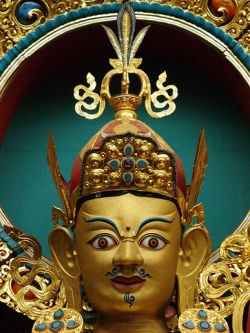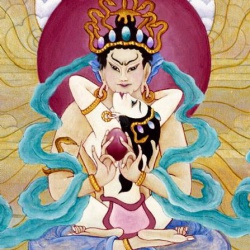Various states of Devachan
THE speculations of the Western mind have hitherto scarcely ever depicted any higher future life than that of the Kama and Rupa lokas, or the lower, intra-terrestrial "spirit-worlds." According even to exoteric Buddhistic philosophy, discarnate beings are divided into three classes. (1) Kamavachara, or those who are still under the dominion of the passions in Kamaloka; (2) Rupavachara, or those who have progressed to a higher stage, but still retain vestiges of their old form in Rupa loka; and (3) Arupavachara, or those who are become formless entities in the Arupa lokas of the highest Devachan.
All depends on the degree of the monad's spirituality and aspirations. The astral body of the fourth principle -- called Kama, because inseparable from Kama loka -- is always within the attraction of terrestrial magnetism; and the monad has to work itself free of the still finer yet equally potent attractions of its (lower) Manas before it ever reaches in its series of Devachanic states, the upper-Arupa regions. Therefore, there are various degrees of Devachanees. In those of the Arupa lokas the entities are as subjective and truly "not even as material as that ethereal body-shadow -- the Mayavi-rupa." But only very few reach there skipping the lower degrees. There are those Devachanees, men of the highest moral calibre and goodness when on earth, who, owing to their sympathy for old intellectual researches and especially for unfinished mental work, are for centuries in the Rupa-lokas in a strict Devachanic isolation -- literally so, since men and loved relatives have all vanished out of sight before this intense and purely spiritual passion for intellectual pursuit.
For an example of the "study-bound" condition, take the mental state of the dying Berzelius, whose last thought was one of despair that his work should be interrupted by death. This is Tanha (Hindu Trishna) or an unsatisfied yearning which must exhaust itself before the entity can move on to the purely a-rupa condition. A provision is made for every case, and in each case it is created by the dying man's last uppermost desire. The scholar who had mainly lived under the influence of manas, and for the pleasure of developing his highest physical intelligence, kept absorbed in the mysteries of the material universe, will still be magnetically held by his mental attractions to scholars and their work, influencing and being influenced by them subjectively (though in a manner quite different from that known in séance-rooms and by mediums) until the energy exhausts itself and Buddhi becomes the only regnant influence.
The same rule applies to all the activities, whether of passion or sentiment, which entangle the traveling monad (the Individuality) in the relationships of any given birth. The discarnate must consecutively mount each rung of the ladder of being upward from the earthly subjective to the absolutely subjective. And when this limited Nirvanic state of Devachan is attained, the entity enjoys it and its vivid though spiritual realities until that phase of Karma is satisfied and the physical attraction to the next earth-life asserts itself. In Devachan, therefore, the entity is affected by and reciprocally affects the psychic state of any other entity whose relationship is so close with it as to survive the purgatorial evolution of the lower post-mortem spheres. Their intercourse will be sensed spiritually, and still, so far as any relationship until now postulated by Western thinkers goes, each will be "dissociated from the other."
Yet, as the monad moves on from birth to birth and passes its lower and Devachanic spheres after each fresh earthly existence, the mutual ties created in each birth must weaken and at last grow inert, before it can be reborn. The record of those relationships imperishably endures in the Akasa, and they can always be reviewed when, in any birth, the being evolves his latent spiritual powers to the "fourth stage of Dhyana"; but their hold upon the being gradually relaxes. This is accomplished in each inter-natal Devachan; and when the personal links -- magnetic or psychic, as one may prefer to call them -- binding the Devachanee to other entities of the next previous life, whether relatives, friends, or family, are worn out, he is free to move on in his cyclic path. Were this obliteration of personal ties not a fact, each being would be traveling around the Kalpa entangled in the meshes of his past relationships with his myriad fathers, mothers, sisters, brothers, wives, etc., of his numberless births: a jumble, indeed!

